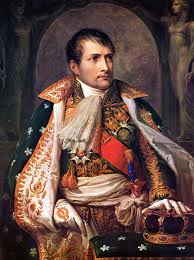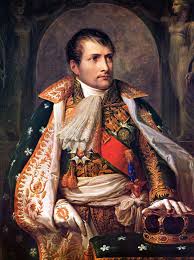After Napoleon was defeated by the British and Allied troops at the Battle of Waterloo in the early 1800s, he was forced to abdicate his authority and flee France. His intentions, it is thought, were to flee to America, but he was intercepted at the seaport by British troops.
The British sent him in exile to the isolated island of St Helena in the South Atlantic, where he died from stomach cancer six years later, in 1821. His body was later exhumed and transported back to Paris, where it was buried in Les Invalides.
Historians and researchers have come to debate what may have happened if Napoleon had made it to America. It is documented that Napoleon himself did in fact have visions and plans for a life in America; there were many failed plots to help him escape St Helena for the United States. At one point a relative of Napoleon’s had even written a letter stating that he was heading to the States.
When the Prussian Army was advancing towards Paris in the final days of the war, Napoleon is said to have been reading a lot about the New World, its newly discovered flora and fauna, and its geographical landscapes. It is believed he had even renamed himself Colonel Muiron, should he make it to America.
It is thought that Napoleon did not have visions of a powerful role in America, but instead a life of privacy devoted to science. When he abdicated he noted that he believed his political life was over. But not wanting to be idle and without needing to oversee an empire, Napoleon believed science was the one thing that could keep him occupied and his energies focused.
It is believed that he planned on transferring money to an American bank while a number of his servants were gathering up his books, china, furniture, military equipment; even horses and stablemen were ready to be transported by sea to America.
A keen supporter of Napoleon was French-born Stephen Girard, who had immigrated to the United States.
He had made his fortune in Pennsylvania and was one of America’s richest people in the early 1800s. It is said that he was a central player in the 1803 negotiations between President Jefferson and France for the Louisiana Purchase. Reports say that Girard had a rescue plan to get Napoleon to Maryland, where he could hide away.
Meanwhile, sympathisers in America saw Napoleon as someone seeking asylum from the Old World, and they celebrated his potential arrival.
Even though it may have been Napoleon’s intention to try to escape to America, records show that when a hiding place was found for him in the hold of a Danish ship, Napoleon claimed that this was not an escape route worthy of him, the NPR News reports.
According to historians Napoleon might have settled in America peacefully if he had made it there. He had a brother in New Jersey, where he may have decided to reside. However, it is possible that supporters back home in France might have tried to stir up backing for either Napoleon’s return to his homeland or for his son to be placed on the throne.
Alternatively, Napoleon might have tried to rule a colony started in America. Supporters had already attempted to start Napoleonic colonies in Texas and Alabama, but being under Spanish rule at the time they did not succeed. Napoleon might have also tried to invade and capture a Spanish colony such as Mexico. Nevertheless, history notes that Napoleon surrendered to the British, which he later deemed a mistake, and wished he had fled to America as he believed his life on St Helena was ‘all in error’.

